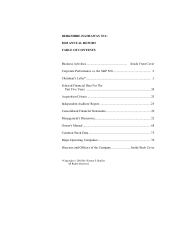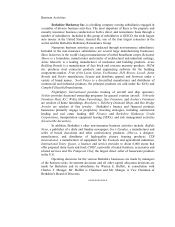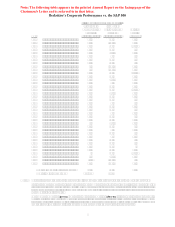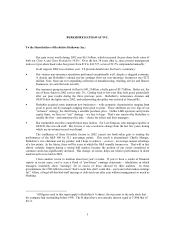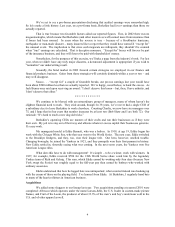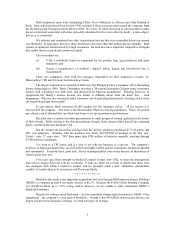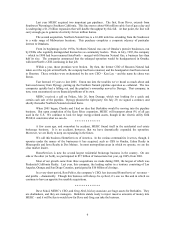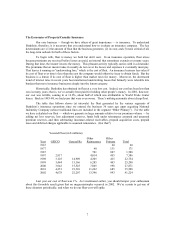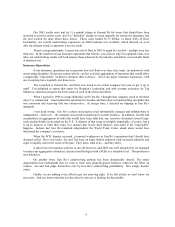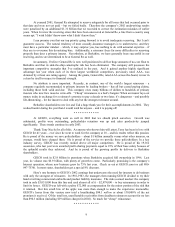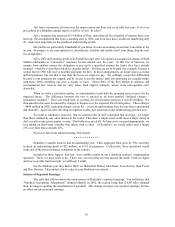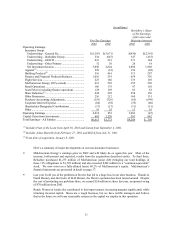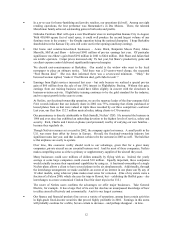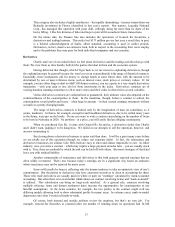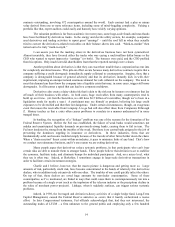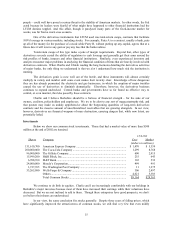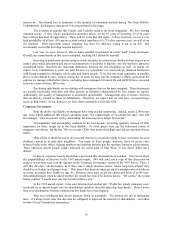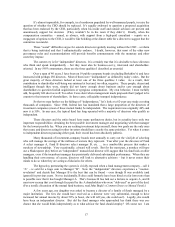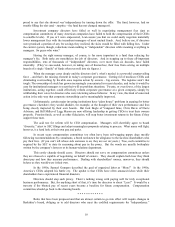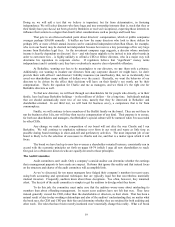Berkshire Hathaway 2002 Annual Report Download - page 10
Download and view the complete annual report
Please find page 10 of the 2002 Berkshire Hathaway annual report below. You can navigate through the pages in the report by either clicking on the pages listed below, or by using the keyword search tool below to find specific information within the annual report.9
At yearend 2001, General Re attempted to reserve adequately for all losses that had occurred prior to
that date and were not yet paid – but we failed badly. Therefore the company’ s 2002 underwriting results
were penalized by an additional $1.31 billion that we recorded to correct the estimation mistakes of earlier
years. When I review the reserving errors that have been uncovered at General Re, a line from a country song
seems apt: “I wish I didn’ t know now what I didn’ t know then.”
I can promise you that our top priority going forward is to avoid inadequate reserving. But I can’ t
guarantee success. The natural tendency of most casualty-insurance managers is to underreserve, and they
must have a particular mindset – which, it may surprise you, has nothing to do with actuarial expertise – if
they are to overcome this devastating bias. Additionally, a reinsurer faces far more difficulties in reserving
properly than does a primary insurer. Nevertheless, at Berkshire, we have generally been successful in our
reserving, and we are determined to be at General Re as well.
In summary, I believe General Re is now well positioned to deliver huge amounts of no-cost float to
Berkshire and that its sink-the-ship catastrophe risk has been eliminated. The company still possesses the
important competitive strengths that I’ ve outlined in the past. And it gained another highly significant
advantage last year when each of its three largest worldwide competitors, previously rated AAA, was
demoted by at least one rating agency. Among the giants, General Re, rated AAA across-the-board, is now in
a class by itself in respect to financial strength.
No attribute is more important. Recently, in contrast, one of the world’ s largest reinsurers – a
company regularly recommended to primary insurers by leading brokers – has all but ceased paying claims,
including those both valid and due. This company owes many billions of dollars to hundreds of primary
insurers who now face massive write-offs. “Cheap” reinsurance is a fool’ s bargain: When an insurer lays out
money today in exchange for a reinsurer’ s promise to pay a decade or two later, it’ s dangerous – and possibly
life-threatening – for the insurer to deal with any but the strongest reinsurer around.
Berkshire shareholders owe Joe and Tad a huge thank you for their accomplishments in 2002. They
worked harder during the year than I would wish for anyone – and it is paying off.
* * * * * * * * * * * *
At GEICO, everything went so well in 2002 that we should pinch ourselves. Growth was
substantial, profits were outstanding, policyholder retention was up and sales productivity jumped
significantly. These trends continue in early 2003.
Thank Tony Nicely for all of this. As anyone who knows him will attest, Tony has been in love with
GEICO for 41 years – ever since he went to work for the company at 18 – and his results reflect this passion.
He is proud of the money we save policyholders – about $1 billion annually versus what other insurers, on
average, would have charged them. He is proud of the service we provide these policyholders: In a key
industry survey, GEICO was recently ranked above all major competitors. He is proud of his 19,162
associates, who last year were awarded profit-sharing payments equal to 19% of their base salary because of
the splendid results they achieved. And he is proud of the growing profits he delivers to Berkshire
shareholders.
GEICO took in $2.9 billion in premiums when Berkshire acquired full ownership in 1996. Last
year, its volume was $6.9 billion, with plenty of growth to come. Particularly promising is the company’ s
Internet operation, whose new business grew by 75% last year. Check us out at GEICO.com (or call 800-
847-7536). In most states, shareholders get a special 8% discount.
Here’ s one footnote to GEICO’ s 2002 earnings that underscores the need for insurers to do business
with only the strongest of reinsurers. In 1981-1983, the managers then running GEICO decided to try their
hand at writing commercial umbrella and product liability insurance. The risks seemed modest: the company
took in only $3,051,000 from this line and used almost all of it – $2,979,000 – to buy reinsurance in order to
limit its losses. GEICO was left with a paltry $72,000 as compensation for the minor portion of the risk that
it retained. But this small bite of the apple was more than enough to make the experience memorable.
GEICO’ s losses from this venture now total a breathtaking $94.1 million or about 130,000% of the net
premium it received. Of the total loss, uncollectable receivables from deadbeat reinsurers account for no less
than $90.3 million (including $19 million charged in 2002). So much for “cheap” reinsurance.
* * * * * * * * * * * *

